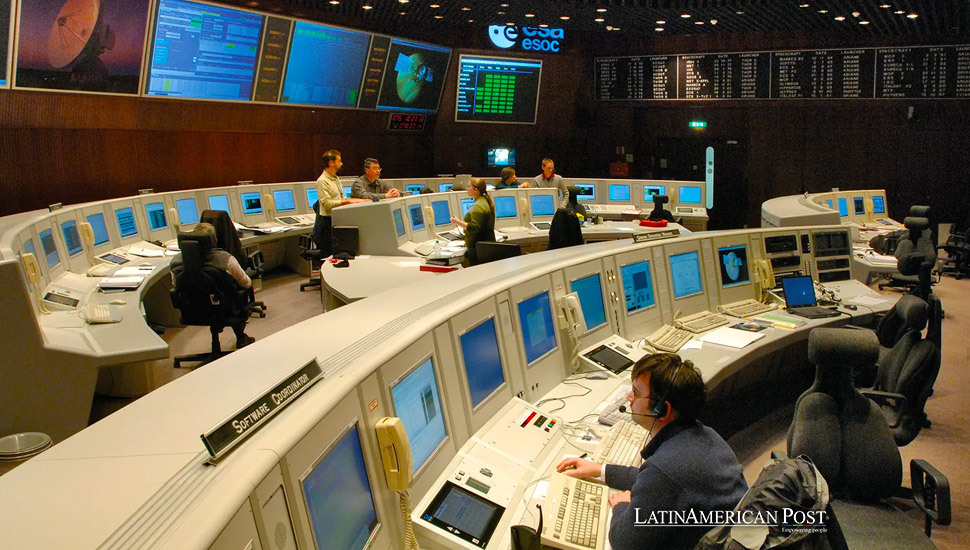Latin American Citizens Can Volunteer to Take Part in Pioneering Space Research

A new citizen science project by the European Space Agency (ESA) and the Euclid Consortium allows Latin Americans to help identify millions of galaxies, advancing our understanding of the universe.
A groundbreaking citizen science project launched by the European Space Agency (ESA), in collaboration with the Euclid Consortium, the Instituto Astrofísico de Canarias (IAC), and the Zooniverse platform, is set to revolutionize the study of galaxies. This initiative enables volunteers from Latin America and worldwide to identify the shapes of millions of galaxies captured by the ESA’s Euclid space telescope. The goal is to train deep neural networks of artificial intelligence (AI) to create the most extensive galactic morphology catalog to date, as reported by the IAC.
In November 2023 and May 2024, the world witnessed the impressive quality of the ESA’s Euclid mission as its first images were made public. These images showcased various sources, ranging from nearby nebulas to distant galaxy clusters. According to the IAC, this is just the beginning, as Euclid continues its mission to map the universe, capturing images of hundreds of thousands of distant galaxies.
Over the next six years, the mission is expected to send about 100 GB of data daily to Earth, with Euclid planning to release its first data catalogs for the scientific community starting in 2025. Meanwhile, the Galaxy Zoo project volunteers can view previously unseen images from the telescope. The initial dataset, containing tens of thousands of galaxies selected from over 800,000 images, is now available on the platform, awaiting classification.
Marc Huertas-Company, a researcher at the Instituto de Astrofísica de Canarias (IAC) and the scientific exploitation lead for the Euclid Consortium, highlighted the significance of the project: “If you participate in the project, you could be the first human to see the galaxy in the image.” The image under examination shows 1,000 galaxies in the Perseus cluster and over 100,000 more distant galaxies in the background, each containing hundreds of billions of stars.
Empowering Latin American Volunteers
The initiative has attracted significant interest in Latin America, where astronomy enthusiasts and students from various countries are eager to contribute to this monumental effort. The Zooniverse platform’s accessibility has democratized space research, allowing people from diverse backgrounds to engage with cutting-edge science. Many of these faint galaxies have never been seen before, with some so distant that their light has taken 10 billion years to reach Earth. Participating in the Galaxy Zoo project offers a unique educational experience, providing firsthand knowledge of astronomical phenomena and the chance to contribute to a global scientific effort.
The IAC emphasizes that these classifications are scientifically valuable and serve as training data for AI algorithms. “Humans need to teach AI what to look for, as algorithms struggle to classify galaxies without guidance. Together, humans and AI can accurately identify an unlimited number of galaxies,” says Huertas-Company. On Zooniverse, the team developed an AI algorithm called ZooBot. This algorithm examines Euclid’s images and tags the “easier” ones, which have many examples from previous galaxy studies. When ZooBot is unsure about a galaxy’s classification, it shows the image to users to gather their classifications, helping the algorithm learn more.
The Euclid mission, launched in July 2023, began its routine scientific observations on February 14, 2024. Its primary objective is to reveal the hidden influence of dark matter and energy on the visible universe. Over six years, Euclid will observe the shapes, distances, and movements of billions of galaxies up to 10 billion light-years away.
Bridging Gaps with Science
The collaborative effort between professional astronomers and citizen scientists is crucial for the success of the Euclid mission. Volunteers’ contributions will help refine AI models that can autonomously analyze vast amounts of astronomical data. This synergy between human input and machine learning accelerates the discovery process and enhances the accuracy of the data collected.
This initiative is an opportunity for Latin American participants to be at the forefront of astronomical research. Engaging with the Galaxy Zoo project offers a unique educational experience, providing firsthand knowledge of astronomical phenomena and the chance to contribute to a global scientific effort. This participation enhances understanding of the universe and connects volunteers to a broader scientific community.
The Euclid mission’s findings will deepen our understanding of the universe’s structure and the fundamental forces at play. By mapping billions of galaxies, Euclid aims to provide insights into how dark matter and energy influence cosmic evolution. This knowledge could lead to breakthroughs in physics and cosmology, potentially reshaping our comprehension of the universe.
Fostering a Culture of Science
The success of the Euclid mission and the Galaxy Zoo project underscores the importance of citizen science in modern research. By involving the public in scientific endeavors, these projects foster a greater appreciation for science and inspire future scientists.
For Latin American participants, the experience is both educational and rewarding. They gain firsthand knowledge of astronomical phenomena and contribute to a global scientific effort. This engagement enhances their understanding of the universe and connects them to a broader scientific community, fostering a sense of excitement and motivation.
The IAC’s collaboration with the ESA and the Euclid Consortium highlights the power of international cooperation in advancing scientific knowledge. As more data becomes available, the role of citizen scientists will continue to grow, driving forward our understanding of the cosmos.
The participation of Latin American volunteers in this project not only demonstrates the region’s growing interest in and contribution to global scientific endeavors but also their role in shaping the future of space exploration and research.
Future Prospects for Latin American Participation
The collaborative effort between professional astronomers and citizen scientists is crucial for the success of the Euclid mission. Volunteers’ contributions will help refine AI models that can autonomously analyze vast amounts of astronomical data. This synergy between human input and machine learning accelerates the discovery process and enhances the accuracy of the data collected.
As more data becomes available, the role of Latin American citizen scientists will continue to grow, driving forward our understanding of the cosmos. The Euclid mission’s findings will deepen our understanding of the universe’s structure and the fundamental forces at play. By mapping billions of galaxies, Euclid aims to provide insights into how dark matter and energy influence cosmic evolution. This knowledge could lead to breakthroughs in physics and cosmology, potentially reshaping our comprehension of the universe.
The Euclid mission and the Galaxy Zoo project represent a significant step forward in studying the universe, with Latin American volunteers playing a vital role in this global scientific effort. Their contributions are helping to build a more comprehensive understanding of our cosmos, demonstrating the power of citizen science and international collaboration. As the project progresses, the involvement of Latin American participants will continue to be a driving force in the quest to unlock the mysteries of the universe.





